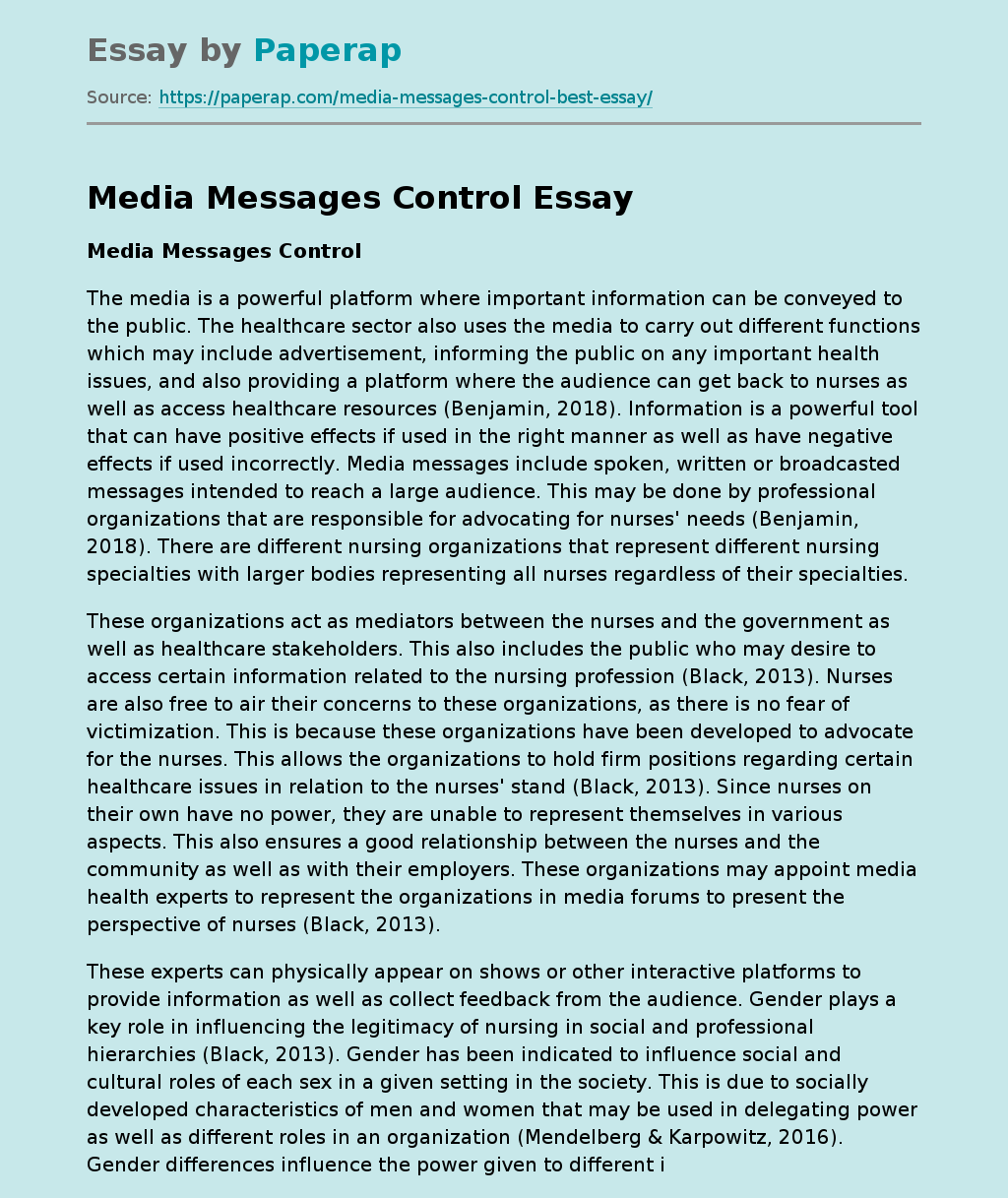Media Messages Control
The following example essay on “Media Messages Control” explains that Information is a powerful tool that can have positive effects if used in the right manner as well as have negative effects if used incorrectly.
Media Messages Controlcarry out different functions which may include advertisement, informing the public on any important health issues, and also providing a platform where the audience can get back to nurses as well as access healthcare resources (Benjamin, 2018).
Media messages include spoken, written or broadcasted messages intended to reach a large audience.
This may be done by professional organizations that are responsible for advocating for nurses’ needs (Benjamin, 2018). There are different nursing organizations that represent different nursing specialties with larger bodies representing all nurses regardless of their specialties.
These organizations act as mediators between the nurses and the government as well as healthcare stakeholders. This also includes the public who may desire to access certain information related to the nursing profession (Black, 2013). Nurses are also free to air their concerns to these organizations, as there is no fear of victimization.
This is because these organizations have been developed to advocate for the nurses. This allows the organizations to hold firm positions regarding certain healthcare issues in relation to the nurses’ stand (Black, 2013).
Since nurses on their own have no power, they are unable to represent themselves in various aspects. This also ensures a good relationship between the nurses and the community as well as with their employers. These organizations may appoint media health experts to represent the organizations in media forums to present the perspective of nurses (Black, 2013).
These experts can physically appear on shows or other interactive platforms to provide information as well as collect feedback from the audience. Gender plays a key role in influencing the legitimacy of nursing in social and professional hierarchies (Black, 2013). Gender has been indicated to influence social and cultural roles of each sex in a given setting in the society. This is due to socially developed characteristics of men and women that may be used in delegating power as well as different roles in an organization (Mendelberg & Karpowitz, 2016).
Gender differences influence the power given to different individuals as well as their social influence. Research has indicated men to posses legitimate power compared to the women. This means that men are thought to be more influential with the women having a higher level of referent power meaning that they are more easily influenced (Mendelberg & Karpowitz, 2016).
This has led to men having high-status roles than the women which is associated with legitimate power due to these roles. These differences also influence the strategies used by men and women due to the expectations in professional as well as social settings (Sepasi, Abbaszadeh, Borhani, & Rafiei, 2016). These expectations start at the family level where the men have more power and responsibilities with the women being delegated other roles within the family. Men tend to acquire managerial or top leadership in nursing profession (Sepasi et al., 2016).
Female nurses, on the other hand, tend to hold lower managerial positions as they are more influential and appealing to patients than their male counterparts. Gender is one of the most causes of power relations which requires individuals to enhance their understanding on this aspect. This is because gender has shaped power relations at different professional hierarchies that start at the family structure (Sepasi et al., 2016).
References
- Benjamin, A. (2018). The Nurse’s Growing Role in Media. American Nurse Today, 13(2), 42.
- Black, B. (2013). Professional nursing: Concepts and challenges. Elsevier: Saunders.
- Mendelberg, T., & Karpowitz, C. (2016). Power, Gender, and Group Discussion. Advances in Political Psychology 37(1), 23-60.
Media Messages Control. (2019, Dec 06). Retrieved from https://paperap.com/media-messages-control-best-essay/

